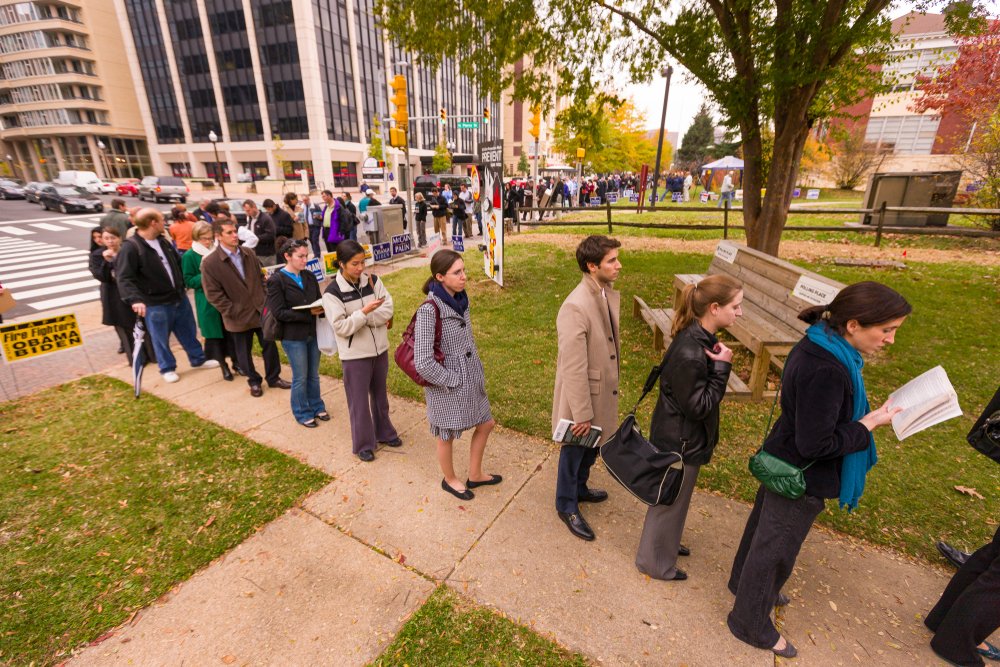Major cities and states have faced challenges with poll workers and voter turnout as this year’s election season unfolds; people are worried about the coronavirus. In Israel, some election employees refused to count ballots cast by voters who were quarantined just because they might have the sickness. The list of states delaying their primaries is quickly increasing, with Ohio Gov. Mike DeWine making a late night announcement last week to suddenly close polls for the long-scheduled presidential primary election. And Washington, which held its primary entirely by mail, advised voters to use wet sponges to seal their ballot envelopes rather than licking them. They didn’t want to take any chances the virus could survive in the mail. The virus can in some cases survive on paper for five days.
We are getting an early glimpse of the effect an incipient pandemic can have on elections, and it raises troubling questions for November. If last Tuesday’s votes were any indication, we can expect sharp declines in states that have yet to vote, since the virus is reported in every state. The entire primary season could be a tame prelude to November. Imagine if the pandemic remains unchecked by Election Day. Voters would face an unacceptable choice between facing the risk of getting exposed at a polling station or shirking their civic duty.

Election officials should plan now to bolster our political system’s resilience – our ability to handle unforeseen events like this one without major electoral disruption. A resilient election system ensures we have the flexibility and hardiness to persevere in the face of potential disasters, including pandemics.
Since there is no national election authority, each state must make its own preparations, with decision-making often pushed down to localities and even precincts. Measures thus far have largely been prosaic and pragmatic.
Even if we weather the 2020 coronavirus, the problem isn’t going away. We risk further pandemics in future, and other disasters could easily affect our ability to vote. Factors such as urbanization, globalization and climate change will worsen the challenges. And disease isn’t the only potential election-disrupting natural disaster. Hurricanes Andrew in 1992, Sandy in 2012 and Michael in 2018 all affected voting. In the latter case, even though Michael hit Florida a month earlier, thousands of voters were still homeless by Election Day, prompting one local official to let citizens fax or email in their ballots.
Relying on traditional, precinct-based polling places with voters gathering on the first Tuesday in November reveals a stark reality: our voting process is glaringly vulnerable. These gathering places are weaknesses in a world of developing threats.
So how can states increase our election system’s resilience? First, they must enable “social distance” by dispersing voters, both geographically and temporally. They should permit more citizens to cast ballots remotely and before Election Day. Forty states and the District of Columbia now permit in-person early voting (a 41st, Delaware, will allow it starting in 2022). Four states conduct their elections entirely by mail, and 21 others allow some to be run that way. Both approaches should be instituted nationwide.

But we need longer-term solutions as well, as we face enduring problems. Printing and distributing ballots can be time-consuming, unwieldy and subject to disruptions. We should leverage cutting-edge technology to maximize the resilience of our voting system.
This cannot happen overnight. The challenges during the Iowa caucus stemmed from hastily developed tabulation technology which left no room for training, testing or gradual implementation. Thankfully, there are a few examples that reflect a more promising way to employ new technology — jurisdictions in Utah,Washington, Oregon and West Virginia have already conducted successful trials using smartphone app-based voting, followed by stringent audits to confirm the integrity of all submitted ballots. One of the technologies in these pilots comes from Voatz –a company whose board I advise.
States must continue finding new ways to augment election resilience through carefully- controlled pilots and by stress-testing newer technological solutions. State leaders, including in West Virginia and Utah– are championing the effort, especially for voters who have historically faced challenges getting to the polls.
Smartphone app-based voting with multi-factor authentication enables remote identity proofing of the voter. It produces a paper ballot for tabulation, and employs a blockchain-based infrastructure for auditing and data security. Such systems have already been successfully used to facilitate voting for Americans abroad.
With luck, coronavirus will be contained by November. But dodging this disaster would not mean we can avoid others. We must prepare now.
Dr. Eric Haseltine advises Voatz, which is deploying smartphone voting technology. An author, futurist, and neuroscientist, he was associate director, CTO for national intelligence at the Federal Office of the Director of National Intelligence, director of research at the National Security Agency, executive vice president at Walt Disney Imagineering, and a director of engineering at the Hughes Aircraft Company.















